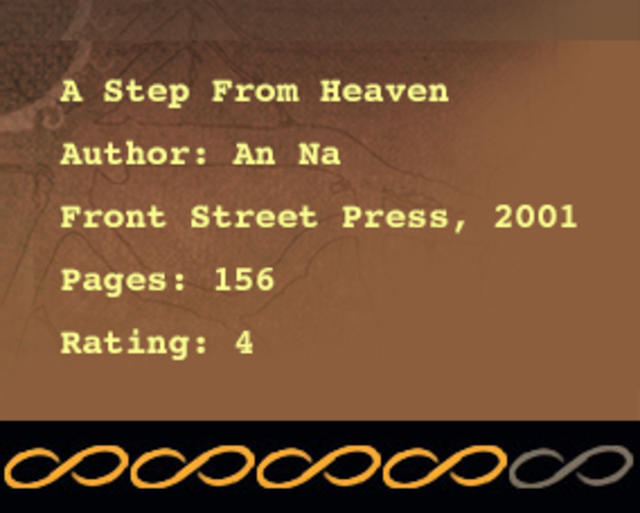A Review of A Step from Heaven
A Step from Heaven tells the fictitious story of Young Ju, a girl whose Korean family moves to America in the search of a better life. Yet Mi Gook, which means “America” in Korean, is not the heaven Young Ju initially believes it to be.

Due to personal troubles and conflicting traditional and foreign values, Young and her family find that overcoming the “breaking” of abuse and domestic violence, which is “too loud, too strong,” takes more than just moving to another continent.
Though the book was first published in 2001, it transcends time by capturing the timelessness of growing up, the gradual shift from a childlike innocence to a jaded maturity. For instance, when Young first arrives in Mi Gook, she remains blindingly optimistic when she has trouble learning English. She tells herself that though she “knows little Mi Gook words now,” someday she will know “all of them.” In contrast, the high school Young realizes harsher realities, realizes that she “is not a child anymore” and does “not have time to wait for God.”
A Step from Heaven is heavy in its content; the novel deals in part with abuse and domestic violence. Young copes with her family member’s abusive nature by hiding under the covers and pretending she is elsewhere. Her view on the abuse, as well as her portrayal of the abuser, is uncomplicated — her main emotions regarding the issue are sadness and fear. Rarely does Young reflect on the impact of the family member’s violence; she does so only towards the very end of the novel.

Though at times I felt Young’s perspective a bit too young — granted, the book starts when she is four — I was captivated from start to finish. However, I will shy away from deeming Young’s perspective as more “authentic” than others. Doing so takes away from other voices in literature, other voices with stories just as real as Young’s.
Often Americans feel torn between cultures, lost in a world that demands they pinpoint every aspect of their identity. Many Asian Americans, myself included, experience this mental struggle, where they must fit cleanly into one set identity. A Step from Heaven explores such struggle from both the child’s and parent’s perspectives. Young feels torn between loyalty to her parents and loyalty to herself, torn between retaining her Korean culture and assimilating into American life. Her parents struggle with instilling Korean culture into Young’s life while juggling work.
The author, An Na, received many well-deserved accolades for A Step from Heaven, including the Michael L. Printz award, and the book has lasting power. The author deconstructs stereotypes about Asians through the transformation of seemingly mundane moments into ones of burning brilliance. For instance, early in the book, Young Ju is forced to get her hair curled. Yet what starts off as a scene about hair quickly exposes the reader to themes of duty and domestic violence. The novel’s deconstruction of stereotypes is far from scripted or mechanical. Instead, it’s beautifully tragic.
Asian Americans have been stereotyped as the model minority, as hardworking, intelligent, and studious individuals. Like all stereotypes, the model minority stereotype is damaging. Often Asians feel the magnitude of their success is lessened by the fact that they’re Asian. “Because you’re Asian” has been uttered countless times to Americans of Asian descent. I’ve personally experienced this — just last month, my A on a test was explained by someone who said “that’s because you’re Asian.”
With four words, all my effort, all the significance of my achievement, was washed away. Young, too, is affected by stereotypes; she yearns to be someone more than just “the good Korean daughter” the world paints her to be.
Perhaps what makes A Step from Heaven so beautiful and tragic is its simple, elegant prose. The author takes the reader’s breath away, not only by breathing humanity into her characters but also by adding immense power in a few words.
“Your life can be different, Young Ju. Study and be strong. In America, women have choices.”
In just three sentences, the author weaves a message of hope, strength, and freedom. Though this idea communicates that America is an expanse of possibility, the wording of such content is what makes the message lasting and powerful. I felt chills when I first read those words. In fact, I still feel chills now.
I rate this story four out of five stars. Though I was often rendered speechless by the beautiful writing, Young’s views on the abuse she received were not nuanced enough. As a reader, I expected a more complex vision in response to the complicated issues brought up. Yet, more often than not, I was so caught up in the story and the author’s sparse prose that everything else floated away.

Valerie Zhang is 16 and in the 11th grade. Her interests include writing anything and everything, reading contemporary fiction, and solving seemingly impossible math problems. She aspires to be an autodidact, or at least seem like one.
